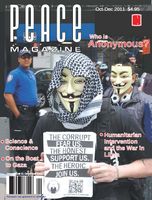
Peace Magazine Oct-Dec 2011, page 29. Some rights reserved.
Search for other articles by Peace Magazine here
by William D. Hartung. New York: Nation Books, 2011.
When I decided to boycott the Canadian census I looked for more information on the company that is involved: Lockheed Martin. Fortunately, I found this book and will use it in my defence if I have a chance to give my point of view.
My problem with using Lockheed Martin to help with the census arises from the fact that my tax dollars should not be going into the coffers of the world’s biggest military company.
In 2009 Lockheed Martin spent $15 million on lobbying and campaign contributions in the US. It spreads its 140,000 employees over 46 states in order to push its jobs agenda with the public.
The book outlines just how Lockheed Martin has been a big influence on US foreign policy. The expansion of NATO with government encouragement and a special fund was a golden opportunity for military producers who would replace old equipment with new hardware —Lockheed Martin’s finest.
Lockheed Martin is active in US base construction, police and firefighter training, refugee operations, recruiting election monitors, helping write the Afghan constitution and the dubious claim of support for peacekeeping. In the US, Lockheed Martin scans the mail, runs the census, processes taxes for the Internal Revenue Service and provides “biometric identification” for the Federal Bureau of Investigation. While they try to “peacewash” their activities, the company also helped train “interrogators” who subsequently were torturing inmates in Abu Ghraib and Guantanamo Bay prison camps.
Lockheed Martin acknowledges that its efforts in non-traditional areas are not altruistic. It is all about business.
Not only is Lockheed Martin the largest defence contractor and exporter in the world, it is also has the biggest intelligence apparatus. It does this through companies running a private, US-financed intelligence network in Pakistan and Afghanistan to track people accused of being militants.
Opposition grew when Lockheed Martin tried to privatize social services in Texas, a move with the possibility of billions in profit. So far this has been defeated.
What does it export in the name of defence? F-16 fighter planes, Patriot Advanced Capability (CAP-3) missile systems, military transport planes, Hellfire missiles, Apache helicopters, as well as bombs and guidance systems. These sound more like offence than defence. Their Multiple-Launch Rocket System sprayed Lebanon with cluster bombs.
The company wants us to think that its weapons exports provide stability by deterring war but critics say this fuels arms races and makes war more likely. One can never be sure just how exported weapons will be used.
The US government has become dependent on private companies to fight its wars and supply the hardware for them. This raises the cost of war and blurs government responsibility.
This book is largely about American examples. Our politicians are not mentioned as receiving any lobbying or funding. But our government should not be using this company to transact our business in any way.
Reviewed by Shirley Farlinger, a Toronto activist.

Peace Magazine Oct-Dec 2011, page 29. Some rights reserved.
Search for other articles by Peace Magazine here